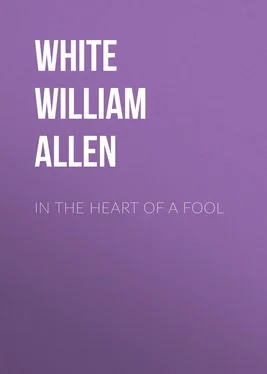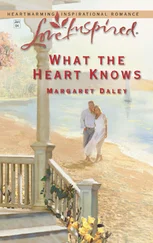William White - In the Heart of a Fool
Здесь есть возможность читать онлайн «William White - In the Heart of a Fool» — ознакомительный отрывок электронной книги совершенно бесплатно, а после прочтения отрывка купить полную версию. В некоторых случаях можно слушать аудио, скачать через торрент в формате fb2 и присутствует краткое содержание. Жанр: foreign_sf, foreign_antique, foreign_prose, на английском языке. Описание произведения, (предисловие) а так же отзывы посетителей доступны на портале библиотеки ЛибКат.
- Название:In the Heart of a Fool
- Автор:
- Жанр:
- Год:неизвестен
- ISBN:нет данных
- Рейтинг книги:3 / 5. Голосов: 1
-
Избранное:Добавить в избранное
- Отзывы:
-
Ваша оценка:
- 60
- 1
- 2
- 3
- 4
- 5
In the Heart of a Fool: краткое содержание, описание и аннотация
Предлагаем к чтению аннотацию, описание, краткое содержание или предисловие (зависит от того, что написал сам автор книги «In the Heart of a Fool»). Если вы не нашли необходимую информацию о книге — напишите в комментариях, мы постараемся отыскать её.
In the Heart of a Fool — читать онлайн ознакомительный отрывок
Ниже представлен текст книги, разбитый по страницам. Система сохранения места последней прочитанной страницы, позволяет с удобством читать онлайн бесплатно книгу «In the Heart of a Fool», без необходимости каждый раз заново искать на чём Вы остановились. Поставьте закладку, и сможете в любой момент перейти на страницу, на которой закончили чтение.
Интервал:
Закладка:
It is a queer world, a world that is past finding out. Here are two children, touching souls in the fleetest, lightest way in the world, and the touch welds them together forever. And along come two others, and even as the old song has it, “after touch of wedded hands,” they are strangers yet. No one knows what makes happiness in love. Certainly marriage is no part of it. Certainly it is not first love, for first lovers often quarrel like cats. Certainly it is not separation, for absence, alas, does not make the heart grow fonder; nor is it children–though the good God knows that should help; for they are love incarnate. Certainly it is not respect, for respect is a stale, cold comforter, and love is deeper than respect, and often lives without it–let us whisper the truth in shame. What, then, is this irrational current of the stuff of life, that carries us all in its sway, that brings us to earth, that guides our destiny here–makes so vastly for our happiness or woe, gives us strength or makes us weak, teaches us wisdom or leads us into folly unspeakable, and all unseen, unmeasured and infinitely mysterious?
There was young Tom Van Dorn. Love was a pleasurable emotion, and because it put a joyous fever in his blood, it enhanced his life. But he never defined love; he merely lived on it. Then there was Ahab Wright who regarded love as a kind of sin and when he married the pale, bloodless, shadowy bookkeeper in Wright & Perry’s store, he regarded the charivari prepared by Morty Sands and George Brotherton as a shameful rite and tried for an hour to lecture the crowd in his front yard on the evils of unseemly conduct before he gave them an order on the store for a bucket of mixed candy. If Ahab had defined love he would have put cupid in side whiskers and a white necktie and set the fat little god to measuring shingle nails, cod-fish and calico on week days and sitting around in a tail coat and mouse-colored trousers on Sunday, reading the Christian Evangel and the Price Current . And again there was Daniel Sands who married five women in a long and more or less useful life. He would have defined love as the apotheosis of comfort. Finally there was Henry Fenn to whom love became the compelling force of his being. Love is many things: indeed only this seems sure. Love is the current of our lives, and like minnows we run in schools through it, guided by instinct and by herd suggestions; and some of us are washed ashore; some of us are caught and devoured, and others fare forth in joy and reach the deep.
One rainy day when the conclave in Brotherton’s cigar store was weary of discussing the quarrel of Mr. Conklin and Mr. Blaine and the eccentricities of the old German Kaiser, the subject of love came before the house for discussion. Dr. Nesbit, who dropped in incidentally to buy a cigar, but primarily to see George Brotherton about some matters of state in the Third ward, found young Tom Van Dorn stroking his new silky mustache, squinting his eyes and considering himself generally in the attitude of little Jack Horner after the plum episode.
“Speaking broadly,” squeaked the Doctor, breaking irritably into the talk, “touching the ladies, God bless ’em–from young Tom’s angle, there’s nothing to ’em. Broad is the petticoat that leadeth to destruction.” The Doctor turned from young Van Dorn, and looked critically at some obvious subject of Van Dorn’s remarks as she picked her way across the muddy street, showing something more than a wink of striped stockings, “Tom, there’s nothing in it–not a thing in the world.”
“Oh,–I don’t know,” returned the youth, wagging an impudent, though good-natured head at the Doctor; “what else is there in the world if not in that? The world’s full of it–flowers, trees, birds, beasts, men and women–the whole damn universe is afire with it. It’s God; there is no other God–just nature building and propagating and perpetuating herself.”
“I suppose,” squeaked the Doctor with a sigh, as he reached for his morning paper, “that if I had nothing else to do for a living except practice law with Joe Calvin on the side and just be twenty-five years old three hundred days in the year, and no other chores except to help old man Sands rib up his waterworks deal, I would hold some such general views myself. But when I was twenty-five, young man, Bedelia and I were running a race with the meal ticket, and our notions as to the moral government of the universe came hard and were deepset, and we can’t change them now.”
George Brotherton, Henry Fenn, Captain Morton and Amos Adams came in with a kind of Greek chorus of general agreement with the Doctor. Van Dorn cocked his hat over his eyes and laughed, and then the Doctor went on in his high falsetto:
“It’s all right, Tom; go it while you’re young. But that kind of love’s young dream generally ends in a nightmare.” He hesitated a minute, and then said: “Well, so long as we’re all here in the family, I’ll tell you about a case I had last night. There’s an old fellow–old Dutchman to be exact, down in Spring township; he came here with us when we founded the town; husky old boy, that is, he used to be fifteen years ago. And he had Tom’s notion about the ladies, God bless ’em, when he was Tom’s age. When I first knew him his notion was causing him trouble, and had settled in one leg, and last night he died of the ladies, God bless ’em.”
The Doctor’s face flinched with pain, and his treble voice winced as he spoke: “Lord, but he suffered, and to add to his physical torment, he knew that he had to leave his daughter all alone in the world–and without a mother and without a dollar; but that isn’t the worst, and he knew it–at the last. This being twenty-five for a living is the hardest job on earth–when you’re sixty, and the old man knew that. The girl has missed his blood taint; she’s not scarred nor disfigured. It would be better if she were; but he gave her something worse–she’s his child!” For a moment the Doctor was silent, then he sighed deeply and shut his eyes as he said: “Boys, for a year and more he’s been seeing all that he was, bud like a glorious poison in his daughter.”
Van Dorn smiled, and asked casually, “Well, what’s her name?” The rest of the group in the store looked down their noses and the Doctor, with his paper under his arm, obviously ignored the question and only stopped in the door to pipe out: “This wasn’t the morning to talk to me of the ladies–God bless ’em.”
The men in the store watched him as he started across the street, and then saw Laura skip gayly toward him, and the two, holding hands, crossed the muddy street together. She was laughing, and the joy of her soul–a child’s soul, shone like a white flame in the dull street and George Brotherton, who saw the pair in the street, roared out: “Well, say–now isn’t that something worth looking at? That beats Niagara Falls and Pike’s Peak–for me.”
Captain Morton looked at the gay pair attentively for a moment and spoke: “And I have three to his one; I tell you, gentlemen–three to his one; and I guess I haven’t told you gentlemen about it, but I got the exclusive agency for seven counties for Golden’s Patent Self-Opening Fruit Can, an absolute necessity for every household, and in another year my three will be wearing their silks and diamonds!” He smiled proudly around the group and added: “My! that doesn’t make any difference. Silk or gingham, I know I’ve got the best girls on earth–why, if their mother could just see ’em–see how they’re unfolding–why, Emma can make every bit as good hash as her mother,” a hint of tears stood in his blue eyes. “Why–men, I tell you sometimes I want to die and go right off to Heaven to tell mother all the fine news about ’em–eh?” Deaf John Kollander, with his hand to his less affected ear, nodded approval and said, “That’s what I always said, James G. Blaine never was a true friend of the soldier!”
Читать дальшеИнтервал:
Закладка:
Похожие книги на «In the Heart of a Fool»
Представляем Вашему вниманию похожие книги на «In the Heart of a Fool» списком для выбора. Мы отобрали схожую по названию и смыслу литературу в надежде предоставить читателям больше вариантов отыскать новые, интересные, ещё непрочитанные произведения.
Обсуждение, отзывы о книге «In the Heart of a Fool» и просто собственные мнения читателей. Оставьте ваши комментарии, напишите, что Вы думаете о произведении, его смысле или главных героях. Укажите что конкретно понравилось, а что нет, и почему Вы так считаете.












